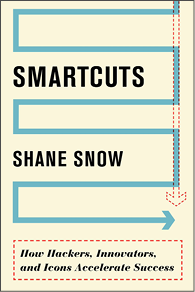A media innovator explains how some people sidestep convention to achieve rapid results.
Reviewed by Allan Fallow

Defining his book’s title, Smartcuts, as “shortcuts with integrity,” designed to achieve “sustainable success quickly through smart work,” author Shane Snow says: “The conventions we grow up with can be hacked. Anyone—not just billionaire entrepreneurs and professional mavericks—can speed up progress in business or life.”
In the book’s first section, “Shorten,” Snow demythologizes the very concept of hacking. No longer does it belong exclusively to criminals and computer scientists, he remarks; instead, life hacks can be undertaken by “anyone who has the capability to approach a problem laterally.” This includes not only those who have figured out that a can opener is the best way to defeat a “blister pak,” but also the genius responsible for digitizing entire libraries of old books by coaxing millions of people to type those floating letters called CAPTCHAs online.
In a chapter titled “Hacking the Ladder,” Snow describes how a former advertising executive parlayed his marketing expertise into a career as a bestselling novelist. (You may have heard of him: James Patterson, currently at 275 million copies sold and counting.) He also does a compelling job of tracing how U.S. presidents have historically used smartcuts to “get to the top before senators get in the door.”
If All Else Fails
Snow’s chapter on the wisdom of “Training with Masters” details why formal mentoring programs are a waste of time, while in “Rapid Feedback” we discover how comics-in-training at Chicago’s Second City progress from flops to funnymen by “destigmatizing failure.” A sense of humor may not be essential to selling residential real estate, but look at the parallels between what motivates REALTORS® and the techniques that Second City uses to accelerate its performers’ growth:
- It gives them instantaneous feedback;
- It depersonalizes critiques, casting the audience reaction as a commentary on the joke rather than the teller; and
- It lowers the stakes and pressure, freeing students to take risks that enable them to improve.
The would-be Malcolm Gladwellisms continue piling up in Sections 2 and 3, dubbed “Leverage” and “Soar.” These are largely arid passages, yet I genuinely appreciated the occasional knowledge nugget unearthed by Snow’s research: Did you know, for example, that investing in the 50 most idealistic brands from 2001 to 2011 would have been 400 percent more profitable than shares of an S&P index fund? And whoever suspected that Einstein never uttered that famous quote about “the definition of insanity”? (According to Snow, it came from a 1981 Narcotics Anonymous handbook.)
The Feeling Is Mutual
And the author takes his own advice: Instead of seeking out objective reviews of his book for the back cover blurbs, Snow hacks that tried-and-true practice by relying on the people he profiled inside the book.
Here, for example, is Give and Take author Adam Grant on the dust jacket of Shane Snow’s Smartcuts, extolling the latter work as, “”One of the most entertaining and thought-provoking books of the year.”” The back-scratching is repaid inside, where Snow quotes Grant three times and cites Give and Take twice.
Scott Gerber of the Young Entrepreneurs Council heaps praise on the book as “surprising and awesome.“It’s Malcolm Gladwell meets Tim Ferriss … a book every 21st-century entrepreneur should read.”” Smartcuts is hardly that—it’s more like Malcolm Gladwell gets trapped on a Ferris wheel—but on page 134, Snow credits Gerber for coining the term “superconnector” and quotes his view that, “”The No. 1 problem with networking is people are out for themselves.””
For a book aiming to persuade readers that “serendipity can be engineered and luck can be manufactured,” Smartcuts feels like a very synthetic extension of the Shane Snow brand: The author invokes his own website in four footnotes—the first appears on the book’s opening page—and by page 9 he is disingenuously exhorting us, “”You can learn more about my company at [such&suchawebsite.com] if you are interested.””
Indeed, I didn’t truly lose patience with this book until I encountered the pioneer of “screamo” music whom Snow holds up as a paragon of “deliberate pattern spotting to compensate for experience.” It was the final straw in a long litany of instances where the author stretches real-world oddities into supposedly representative business cases.
Bottom line? Either Smartcuts is far too hip for this Bear of Very Little Brain, or the book is so far-fetched that it constitutes a Snow job.
You May Also Like…
THANKS FOR THE FEEDBACK
by Douglas Stone and Sheila Heen
[Viking]
368 pages
$23.55/hardcover
Turning evaluations, advice, criticisms and coaching into productive listening and learning.
MASTERY
by Robert Greene
[Viking]
352 pages
$17.67/hardcover
Learn how some of history’s greats — from Charles Darwin to Henry Ford — mastered their crafts and became people who changed the world.
THRIVE
by Arianna Huffington
[Harmony]
352 pages
$17.83/hardcover
Arianna Huffington, co-founder and editor-in-chief, Huffington Post Media Group, thinks business should help you achieve personal wellbeing—not just money and power.
ESSENTIALISM: THE DISCIPLINED PURSUIT OF LESS
by Greg McKeown
[Crown Business]
272 pages
$13.26/hardcover
How to discern what is essential for you to do in your business and eliminate the rest, so you can do less — but better.








